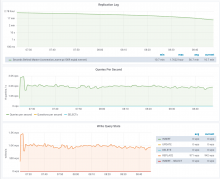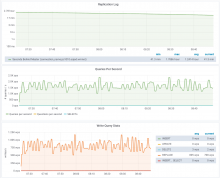The upgrade happened yesterday (2020-05-13), and pc1007 was brought back as pc1 master at roughly 10:16.
The dashboard shows that:
the monitoring queries latency has gone from sub-50ms to spiking frequently to 1-2s- the disk write latency has gone from about 4s to 12-20s
One thing we've noticed is that the io scheduler has changed between stretch and buster:
# buster kormat@pc1007:~(0:0)$ cat /sys/block/sda/queue/scheduler [mq-deadline] none # stretch kormat@pc1009:~(0:0)$ cat /sys/block/sda/queue/scheduler noop [deadline] cfq




